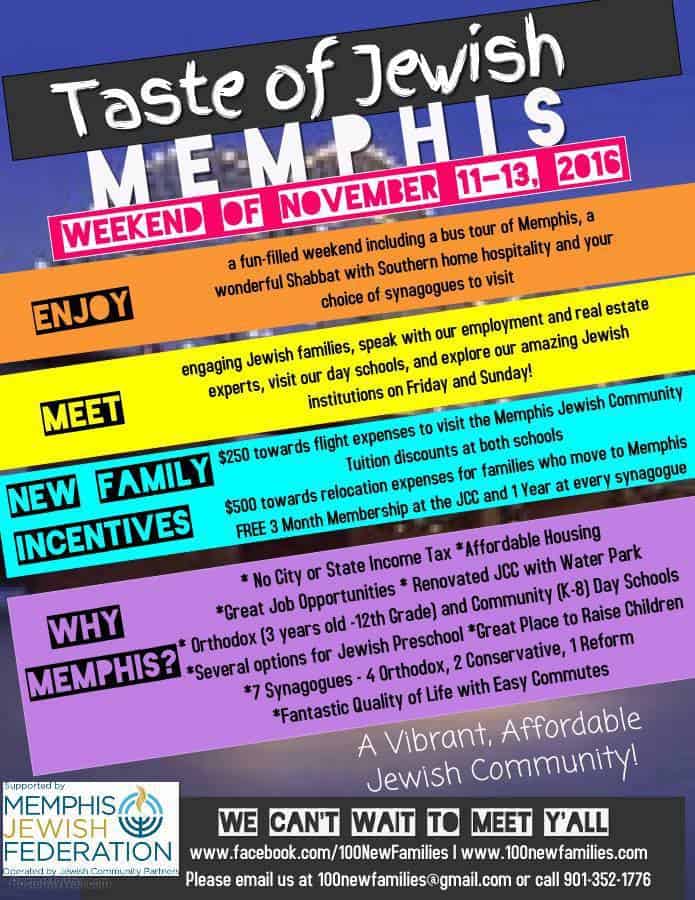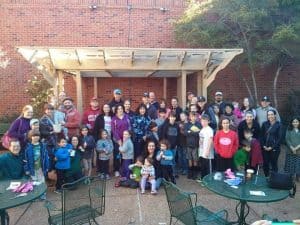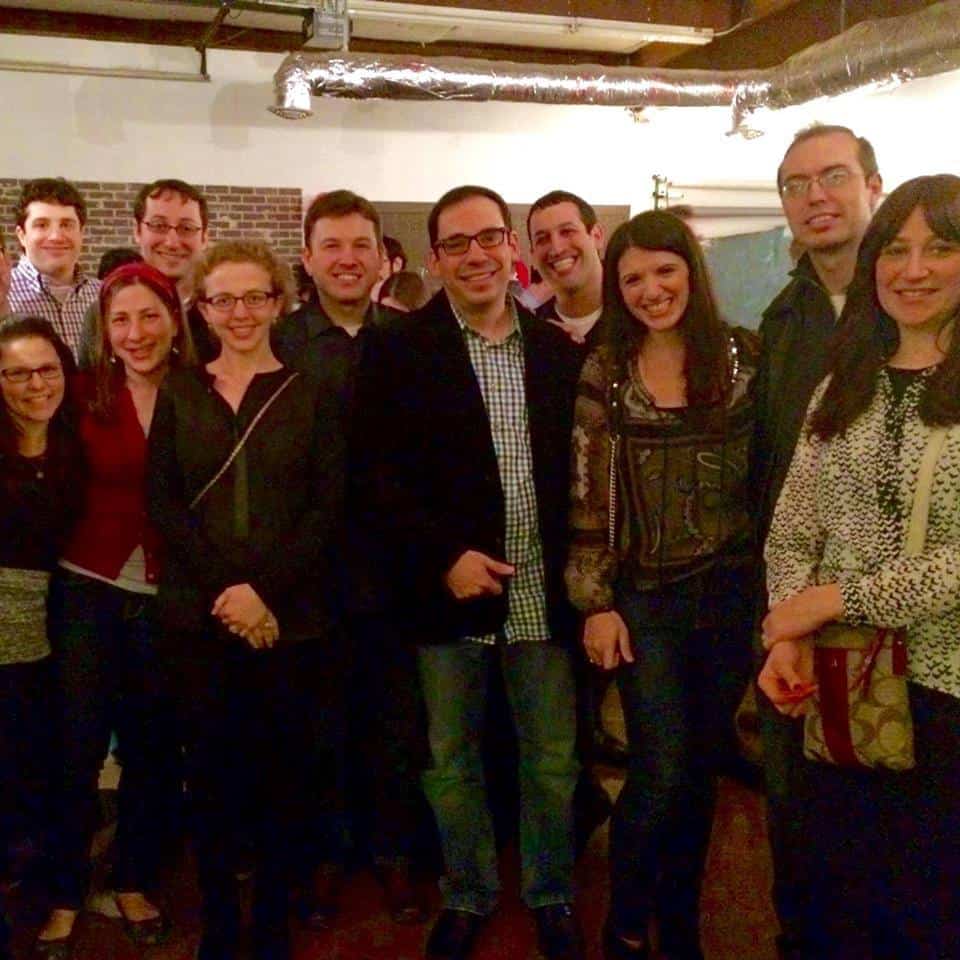The following is excerpted from an article originally published in The New York Jewish Week. It was written by Associate Editor Jonathan Mark and can be read in full here. If you have friends or family that would thrive in the Memphis community, invite them to the Taste of Jewish Memphis weekend, November 11-13. Learn more about the program on the 100 New Families website.
In a season when nothing escapes Heaven’s eye or mercy, let the angels note the renaissance of the Jews in Memphis.
By all weights and measures, the community should be dead or dying, as are most other communities of similar size and isolation. When we speak of Memphis Jews we can almost introduce you to each by name, for so few there are. The Jewish population is estimated at 9,000, fewer Jews than live in the Catskills in winter; one-third fewer Jews than in Albany. When you factor in the national Jewish percentages for the secular, the assimilated and the uninterested, the active population dwindles precipitously. But unlike so many other small Southern communities, the Memphis Jews are refusing to die. Happy warriors, confident, expanding, building, they are almost daring you to visit and not be seduced.
 An ad hoc group, 100 New Families, supported by the Memphis Jewish Federation, is offering $250 toward anyone’s airfare to come to “A Taste of Jewish Memphis,” Nov. 11-13, a Shabbos with “Southern home hospitality.” The weekend includes a tour of the city, meetings with employment and real estate professionals (private homes within the eruv, near shuls, can be had for $200,000); visits to the two Jewish day schools; and another $500 toward relocation expenses. The group is also offering a three-month membership at the JCC, and a year’s membership at the more than half-dozen synagogues, from Reform to Conservative to Modern Orthodox, Young Israel and Chabad.
An ad hoc group, 100 New Families, supported by the Memphis Jewish Federation, is offering $250 toward anyone’s airfare to come to “A Taste of Jewish Memphis,” Nov. 11-13, a Shabbos with “Southern home hospitality.” The weekend includes a tour of the city, meetings with employment and real estate professionals (private homes within the eruv, near shuls, can be had for $200,000); visits to the two Jewish day schools; and another $500 toward relocation expenses. The group is also offering a three-month membership at the JCC, and a year’s membership at the more than half-dozen synagogues, from Reform to Conservative to Modern Orthodox, Young Israel and Chabad.
This is the Tashlich time of year, and this community suggests you throw your regrets and doubts into the Bayou Gayoso, in Memphis, or while standing on Chuck Berry’s Mississippi Bridge. After all, the New Year is a terrific time to consider running away from home.
The renaissance is across the board. A number of Reform and Conservative Jews in town have made a commitment to sending their children to day school and the Orthodox have supported an eruv, two mikvahs and two kollels, the better to attract and keep young families. Necessity is the mother of diversity. At the Bornblum Jewish Community School, 33 percent of the students come from the Reform temple, 28 percent from the Conservative congregation and 38 percent from Orthodox shuls (2 percent are unaffiliated. The second day school, Margolin Hebrew Academy-Feinstone Yeshiva of the South, is an Orthodox school.) There is also economic diversity, with tuition at Bornblum under $10,000, and 10 percent reductions for a family’s second and subsequent children.
Oh, don’t forget, say the recruiters, in Memphis there’s no state or city income tax.
If 9,000 Jews doesn’t seem like much, that’s about as many Jews as were living in one Manhattan neighborhood, Washington Heights, in 2002. That population more than doubled in the years since, and Memphis Jews think they can do the same. In fact, the two Memphis day schools are already more day schools than in Washington Heights and as many as in Riverdale (with 45,000 Jews, and one mikvah).
Several Memphis Jews pointed out that their incentives are not being made out of desperation, as they already have nearly a dozen Jewish institutions and thousands of affiliated Jews. The Memphis incentives are being promoted as the next step in a renaissance, not a first step or a step too late.
Memphis is the largest city in Tennessee, more than 650,000 people whose stories have been told by the likes of W.C. Handy, Chuck Berry, Paul Simon, Johnny Cash, Sun Studios and the blues men of Beale Street. “If Beale Street Could Talk,” goes one of the songs, and the innocent better leave the room before Beale Street starts talking. Almost every Jew in Memphis, it seems, can tell the stories of how Elvis was the greatest “Shabbos goy” this river town ever knew. Long before he moved into Graceland, it seems there wasn’t a Jewish tenement that didn’t know his curled lip and very polite “Yes, ma’am,” if he’d be told, “Elvis, it’s a little dark in here, could you, you know,” and he knew.
Rachel Siegel, an occupational therapist, and her husband, Joel, a pediatrician, moved from the Upper West Side to Memphis in 2004. Joel, now 38, and Rachel, now 36, came and stayed, without regret. Members of the Hadar  community in Manhattan, Joel is past president of the Margolin Hebrew Academy and on the board of the JCC. They are perfectly pleased with the “superb education” that their four children are getting at Margolin.
community in Manhattan, Joel is past president of the Margolin Hebrew Academy and on the board of the JCC. They are perfectly pleased with the “superb education” that their four children are getting at Margolin.
Speaking by telephone from Memphis, Joel recalled that after medical school, “I was looking for a residency opportunity; Rachel was looking for a master’s program in occupational therapy. We spent a Shabbat, to see the Jewish community, and we were very impressed. Twelve years later, we’re still here.”
Both of their programs required a three-year commitment. “So,” said Rachel, “we had three years to figure it out. A year and a half later, we had a child. The Jewish community was wonderful, family-friendly and affordable — and less stressful.” Joel explained that he now had just a two-minute commute. Rachel adds, “I can drop off my kids and get to work in 15 minutes.” And no alternate-side parking and rushing to move the car. “People here live a more relaxed lifestyle,” said Rachel. “The other week was the annual kosher barbecue fest that brings the whole community together.”
